Text
Docker Online Training Hyderabad | Visualpath
Why Developers Should Learn Docker and Kubernetes?
Introduction:
As technology continues to evolve, developers are constantly seeking tools and platforms that can streamline their workflows, increase productivity, and ensure seamless deployment of applications. Two such tools that have become indispensable in the developer toolkit are Docker and Kubernetes.
Docker:
Docker has revolutionized the way applications are packaged, shipped, and deployed. At its core, Docker provides a platform for developers to build, package, and distribute applications as lightweight containers. These containers encapsulate all the dependencies and libraries required for the application to run, ensuring consistency across different environments. - Kubernetes Online Training
One of the key advantages of Docker is its portability. Developers can package their applications along with all the necessary dependencies into a Docker container, allowing them to run seamlessly on any machine with Docker installed. This eliminates the notorious "it works on my machine" problem and simplifies the process of deploying applications across different environments, from development to production.
Furthermore, Docker facilitates a microservices architecture, where applications are broken down into smaller, modular components that can be independently developed, deployed, and scaled. This promotes agility, scalability, and fault isolation, making it easier for developers to iterate on their code and respond to changing business requirements. - Docker Online Training
Kubernetes:
While Docker simplifies the process of containerization, managing a large number of containers across a distributed environment can quickly become complex and challenging. This is where Kubernetes comes into play. Kubernetes, often abbreviated as K8s, is an open-source container orchestration platform that automates the deployment, scaling, and management of containerized applications.
At its core, Kubernetes provides a declarative approach to managing containerized workloads. Developers can define the desired state of their applications using Kubernetes manifests, specifying factors such as the number of replicas, resource requirements, and networking configurations. Kubernetes then ensures that the actual state of the system matches the desired state, automatically scaling applications up or down based on demand and reallocating resources as needed. - Docker and Kubernetes Training
Moreover, Kubernetes offers robust features for service discovery, load balancing, and self-healing, enhancing the resilience and reliability of applications in production environments. It also supports advanced deployment strategies such as rolling updates and canary deployments, allowing developers to release new features gradually while monitoring the impact on performance and stability.
Conclusion:
In conclusion, Docker and Kubernetes represent a powerful combination that empowers developers to build, deploy, and manage applications more efficiently and effectively. By leveraging Docker's containerization technology and Kubernetes' orchestration capabilities, developers can streamline their workflows, increase scalability, and ensure seamless deployment across diverse environments.
Visualpath is the Leading and Best Institute for learning Docker And Kubernetes Online in Ameerpet, Hyderabad. We provide Docker Online Training Course, you will get the best course at an affordable cost.
Attend Free Demo
Call on - +91-9989971070.
Visit : https://www.visualpath.in/DevOps-docker-kubernetes-training.html
WhatsApp : https://www.whatsapp.com/catalog/919989971070/
#docker and kubernetes training#docker online training#docker training in hyderabad#kubernetes training hyderabad#docker and kubernetes online training#docker online training hyderabad#kubernetes online training#kubernetes online training hyderabad
0 notes
Text

Docker and Kubernetes Online Training
Visualpath provides the best Kubernetes Online Training classes by real-time faculty with real-time Projects. We are providing Kubernetes Certification Training Course Demanded in the USA, UK, Canada, India, and Australia. Call on +91-9989971070.
WhatsApp: https://bit.ly/47eayBz
Visit: https://www.visualpath.in/DevOps-docker-kubernetes-training.html
#docker and kubernetes training#docker online training#docker training in hyderabad#kubernetes training hyderabad#docker and kubernetes online training#docker online training hyderabad#kubernetes online training#kubernetes online training hyderabad
0 notes
Text
Kubernetes Online Training Certification
The Key Components of Kubernetes: Control Plane and Compute Plane
Introduction:
Kubernetes has emerged as the leading platform for container orchestration, enabling organizations to efficiently deploy, scale, and manage containerized applications. At the heart of Kubernetes architecture lie two fundamental components: the Control Plane and the Compute Plane.
The Control Plane:
The Control Plane, also known as the Master Node, serves as the brain of the Kubernetes cluster, responsible for managing and coordinating all activities within the cluster. - Docker and Kubernetes Training
It comprises several key components, each playing a distinct role in ensuring the smooth operation of the cluster:
API Server: The API Server acts as the front-end for the Kubernetes control plane. It exposes the Kubernetes API, which allows users to interact with the cluster, define workloads, and query the cluster's state. All management operations, such as creating, updating, or deleting resources, are handled through the API Server.
Scheduler: The Scheduler component is responsible for assigning workloads to individual nodes within the cluster based on resource availability, constraints, and other policies. It ensures that workload placement is optimized for performance, reliability, and resource utilization, taking into account factors such as affinity, anti-affinity, and resource requirements. - Docker Online Training
Controller Manager: The Controller Manager is a collection of controllers that continuously monitor the cluster's state and drive the cluster towards the desired state defined by the user. These controllers handle various tasks, such as managing replication controllers, ensuring the desired number of pod replicas are running, handling node failures, and maintaining overall cluster health.
etcd: etcd is a distributed key-value store used by Kubernetes to store all cluster data, including configuration settings, state information, and metadata. It provides a reliable and highly available storage solution, ensuring that critical cluster data is persisted even in the event of node failures or network partitions. - Kubernetes Online Training
The Compute Plane:
While the Control Plane manages the orchestration and coordination aspects of the cluster, the Compute Plane, also known as the Worker Node, is responsible for executing and running containerized workloads.
It consists of the following key components:
Kubelet: The Kubelet is an agent that runs on each Worker Node and is responsible for managing the node's containers and ensuring they are in the desired state. It communicates with the Control Plane to receive instructions, pull container images, start/stop containers, and report the node's status.
Container Runtime: The Container Runtime is responsible for running and managing containers on the Worker Node. Kubernetes supports various container runtimes, including Docker, containerd, and cri-o, allowing users to choose the runtime that best fits their requirements. - CKA Training Online
Kube Proxy: Kube Proxy is a network proxy that runs on each Worker Node and facilitates network communication between services within the Kubernetes cluster. It maintains network rules and performs packet forwarding, ensuring that services can discover and communicate with each other seamlessly.
Conclusion:
In conclusion, the Control Plane and Compute Plane are two fundamental components of the Kubernetes architecture, working in tandem to orchestrate and manage containerized workloads efficiently.
Visualpath is the Leading and Best Institute for learning Docker And Kubernetes Online in Ameerpet, Hyderabad. We provide Docker Online Training Course, you will get the best course at an affordable cost.
Attend Free Demo
Call on - +91-9989971070.
Visit : https://www.visualpath.in/DevOps-docker-kubernetes-training.html
WhatsApp : https://www.whatsapp.com/catalog/919989971070/
#KubernetesTrainingHyderabad#DockerandKubernetesTraining#KubernetesOnlineTraining#DockerOnlineTraining#DockerTraininginHyderabad#DockerandKubernetesOnlineTraining#KubernetesTraininginAmeerpet
0 notes
Text
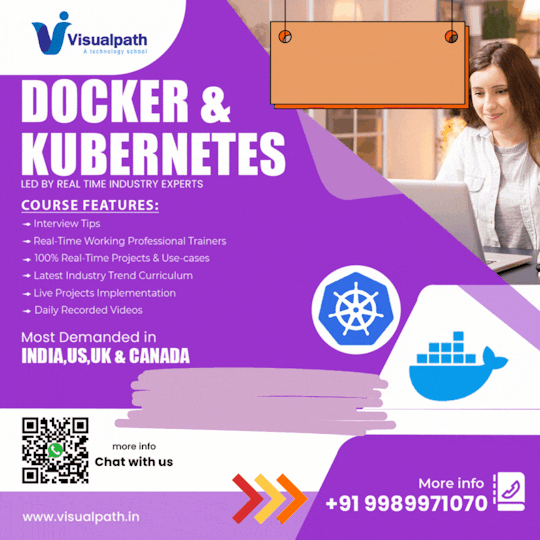
Kubernetes Certification Online Training
Visualpath provides the best Kubernetes CKA Online Training classes by real-time faculty with real-time Projects. We are providing Kubernetes Certification Training Course Demanded in the USA, UK, Canada, India, and Australia. Call on +91-9989971070.
WhatsApp: https://bit.ly/47eayBz
Visit: https://www.visualpath.in/DevOps-docker-kubernetes-training.html
#KubernetesTrainingHyderabad#DockerandKubernetesTraining#KubernetesOnlineTraining#DockerOnlineTraining#DockerTraininginHyderabad#DockerandKubernetesOnlineTraining#DockerOnlineTrainingHyderabad
0 notes
Text
Docker Online Training Hyderabad | Visualpath
Kubernetes Authentication and Authorization
Introduction:
Kubernetes authentication and authorization mechanisms play a critical role in safeguarding clusters against unauthorized access and protecting sensitive workloads and data. - Docker and Kubernetes Training
Authentication in Kubernetes:
Authentication is the process of verifying the identity of users or entities attempting to access a Kubernetes cluster. Kubernetes supports various authentication methods, each catering to different use cases and deployment scenarios:
Client Certificates: Kubernetes can authenticate users based on client certificates signed by a trusted Certificate Authority (CA). This method is commonly used in production environments, where users authenticate using X.509 client certificates issued by the cluster's CA. - Kubernetes Online Training
Static Tokens: Kubernetes allows administrators to create static bearer tokens associated with specific users or service accounts. While convenient for testing and development, static tokens pose security risks if not managed properly and are not recommended for production use.
Service Account Tokens: Kubernetes automatically creates service accounts for pods running within the cluster. Service account tokens, mounted as secrets within pods, enable applications to authenticate with the Kubernetes API server and access cluster resources.
External Identity Providers: Kubernetes can integrate with external identity providers (e.g., LDAP, OAuth, OpenID Connect) for user authentication. This approach enables centralized identity management and single sign-on (SSO) capabilities across multiple Kubernetes clusters. - Docker Online Training
Implementing Authorization Policies:
Authorization, also known as access control, determines the actions users or entities are allowed to perform within a Kubernetes cluster. Kubernetes employs Role-Based Access Control (RBAC) as its primary authorization mechanism, allowing administrators to define granular access policies based on roles and role bindings:
Roles: A role defines a set of permissions (e.g., create, read, update, delete) for a specific set of resources within a Kubernetes namespace. Roles are scoped to a namespace and can be created using YAML manifest files.
Role Bindings: Role bindings associate roles with users, groups, or service accounts, granting them the permissions defined by the corresponding roles. Kubernetes supports both RoleBindings (for assigning roles within a namespace) and ClusterRoleBindings (for assigning roles across the entire cluster). - Kubernetes Training Hyderabad
Cluster Roles: In addition to namespace-scoped roles, Kubernetes supports cluster-wide roles called ClusterRoles. ClusterRoles enable administrators to define global access policies that apply across all namespaces within the cluster.
Best Practices for Kubernetes Authentication and Authorization:
Implement RBAC: Utilize Kubernetes RBAC to define fine-grained access controls based on the principle of least privilege. Regularly review and audit role definitions and role bindings to ensure they align with security policies and least privilege principles.
Leverage Service Accounts: Use Kubernetes service accounts to authenticate and authorize applications and workloads running within the cluster. Avoid using static bearer tokens or overly permissive access controls for service accounts. - Docker and Kubernetes Online Training
Enable Network Policies: Implement Kubernetes Network Policies to control traffic flow between pods and enforce network segmentation. Network policies augment RBAC by restricting network communication based on pod labels, namespaces, and other attributes.
Integrate with Identity Providers: Integrate Kubernetes with external identity providers to enable centralized authentication and SSO across multiple clusters. Leverage standard protocols like OAuth and OpenID Connect for seamless integration with existing identity management systems.
Regularly Rotate Secrets: Rotate client certificates, bearer tokens, and other authentication credentials regularly to mitigate the risk of unauthorized access due to compromised credentials or expired certificates.
Conclusion:
Authentication and authorization are foundational pillars of Kubernetes security, ensuring that only authorized users and workloads can access and interact with cluster resources.
Visualpath is the Leading and Best Institute for learning Docker And Kubernetes Online in Ameerpet, Hyderabad. We provide Docker Online Training Course, you will get the best course at an affordable cost.
Attend Free Demo
Call on - +91-9989971070.
Visit : https://www.visualpath.in/DevOps-docker-kubernetes-training.html
WhatsApp : https://www.whatsapp.com/catalog/919989971070/
#KubernetesTrainingHyderabad#KubernetesOnlineTraining#DockerandKubernetesTraining#DockerOnlineTraining#DockerTraininginHyderabad#DockerandKubernetesOnlineTraining#KubernetesTraininginAmeerpet
0 notes
Text
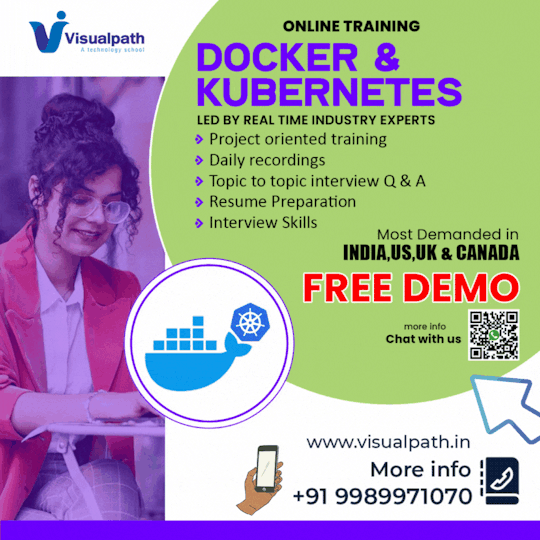
Kubernetes Online Training Hyderabad
Visualpath provides the best Kubernetes Online Training classes by real-time faculty with real-time Projects. We are providing Docker and Kubernetes Training Demanded in the USA, UK, Canada, India, and Australia. Call on +91-9989971070.
WhatsApp: https://bit.ly/47eayBz
Visit: https://www.visualpath.in/DevOps-docker-kubernetes-training.html
#KubernetesTrainingHyderabad#DockerandKubernetesTraining#KubernetesOnlineTraining#DockerOnlineTraining#DockerTraininginHyderabad#DockerandKubernetesOnlineTraining#KubernetesOnlineTrainingHyderabad
0 notes
Text
Kubernetes Online Training | India
Docker Containers and Images: Comprehensive Guide
Introduction:
Docker containers and images have emerged as essential technologies. They have revolutionized the way applications are built, shipped, and run across various computing environments. - Docker and Kubernetes Training
What are Containers?
Containers are lightweight, standalone, and executable packages that contain everything needed to run a piece of software, including the code, runtime, libraries, and dependencies. They encapsulate an application and its environment, ensuring consistency and portability across different platforms. Unlike traditional virtual machines, which require a separate operating system instance for each application, containers share the host system's kernel while maintaining isolation from one another. - Kubernetes Online Training
Containers provide several benefits, including:
Portability: Containers can run consistently across various environments, including development, testing, staging, and production, without modification, thanks to their self-contained nature.
Efficiency: Containers consume fewer resources compared to virtual machines, as they share the host system's kernel and avoid the overhead of running multiple operating system instances. - Docker Online Training
Isolation: Each container operates independently of others, ensuring that applications remain isolated and do not interfere with one another's execution.
Scalability: Containers are highly scalable, allowing developers to easily scale applications up or down based on demand by orchestrating containerized workloads with tools like Kubernetes or Docker Swarm.
What are Images?
Images serve as the building blocks for containers. They are read-only templates that contain the application's code, dependencies, runtime environment, and other configuration files needed to create a container instance.
Key characteristics of images include:
Immutability: Images are immutable, meaning they cannot be changed once they are created. Any modifications to an image result in the creation of a new image layer, preserving the integrity and reproducibility of the original image.
Docker and Kubernetes Online Training
Layered Architecture: Images are composed of multiple layers, each representing a specific component or configuration. This layered architecture enables efficient storage, distribution, and caching of image components.
Versioning: Images can be versioned to track changes and updates over time. Versioning allows developers to roll back to previous versions if needed and facilitates collaboration and reproducibility in software development workflows.
Conclusion:
In conclusion, containers and images play a pivotal role in modern software development and deployment practices. They offer a lightweight, portable, and efficient means of packaging, distributing, and running applications across diverse computing environments.
Visualpath is the Leading and Best Institute for learning Docker And Kubernetes Online in Ameerpet, Hyderabad. We provide Docker Online Training Course, you will get the best course at an affordable cost.
Attend Free Demo
Call on - +91-9989971070.
Visit : https://www.visualpath.in/DevOps-docker-kubernetes-training.html
WhatsApp : https://www.whatsapp.com/catalog/919989971070/
#KubernetesTrainingHyderabad#DockerandKubernetesTraining#KubernetesOnlineTraining#DockerOnlineTraining#DockerTraininginHyderabad#DockerandKubernetesOnlineTraining#DockerOnlineTrainingHyderabad
0 notes
Text
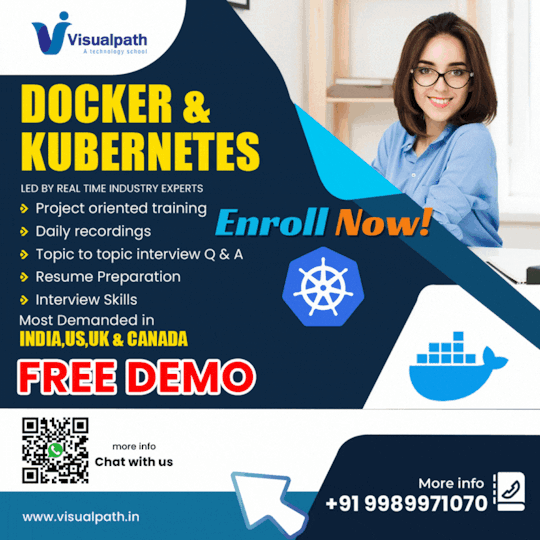
Docker and Kubernetes Online Training
Visualpath provides the best Kubernetes Online Training classes by real-time faculty with real-time Projects. We are providing Docker and Kubernetes Training Demanded in the USA, UK, Canada, India, and Australia. Call on +91-9989971070.
WhatsApp: https://bit.ly/47eayBz
Visit: https://www.visualpath.in/DevOps-docker-kubernetes-training.html
Blog: https://dockerandkubernetesonlinetraining.blogspot.com/
#docker and kubernetes training#docker online training#docker training in hyderabad#kubernetes training hyderabad#docker and kubernetes online training#docker online training hyderabad#kubernetes online training#kubernetes online training hyderabad
0 notes
Text
Docker and Kubernetes Online Training
What is Kubernetes Container Security?
Introduction:
Kubernetes has emerged as a leading platform for container orchestration. As organizations increasingly adopt Kubernetes to manage their containerized applications, the need for robust container security becomes paramount. In this article, we delve into the realm of Kubernetes container security, exploring its significance, challenges, and best practices. - Docker and Kubernetes Training
Kubernetes Container Security:
Kubernetes container security refers to the set of practices, tools, and strategies employed to safeguard containerized workloads orchestrated by Kubernetes. It encompasses various layers of security measures aimed at protecting the integrity, confidentiality, and availability of applications running within Kubernetes clusters. - Docker Training in Hyderabad
Key Challenges in Kubernetes Container Security:
Vulnerability Management: With containerized applications comprising multiple layers of software dependencies, managing vulnerabilities becomes complex. Kubernetes container security requires continuous monitoring and patching of container images and underlying components to mitigate potential risks. - Kubernetes Online Training
Access Control: Kubernetes operates within a multi-tenant environment, necessitating robust access controls to prevent unauthorized users or processes from accessing sensitive resources. Implementing role-based access control (RBAC) and network policies helps enforce least privilege principles and restricts lateral movement within clusters.
Runtime Protection: Securing containers at runtime is crucial for detecting and mitigating anomalous behaviors, such as unauthorized access attempts or malicious activities. Utilizing runtime protection tools and techniques, such as container network security solutions and runtime sandboxes, enhances threat detection and incident response capabilities. - Docker Online Training
Compliance and Governance: Adhering to regulatory requirements and industry standards is imperative for organizations across various sectors. Kubernetes container security must align with compliance mandates by implementing measures such as data encryption, audit logging, and security policy enforcement.
Best Practices for Kubernetes Container Security:
Harden Container Images: Ensure that container images are built from trusted sources, regularly scanned for vulnerabilities, and hardened according to security best practices.
Implement Network Segmentation: Leverage Kubernetes network policies to segment traffic and enforce communication boundaries between application components, reducing the attack surface. - Docker and Kubernetes Online Training
Enable Role-Based Access Control (RBAC): Define granular access controls based on user roles and responsibilities to prevent unauthorized access to Kubernetes resources.
Monitor and Audit: Implement comprehensive logging and monitoring solutions to track activity within Kubernetes clusters, enabling timely detection and response to security incidents.
Conclusion:
As Kubernetes continues to revolutionize container orchestration in cloud-native environments, prioritizing container security is essential to safeguarding critical workloads and data.
Visualpath is the Leading and Best Institute for learning Docker And Kubernetes Online in Ameerpet, Hyderabad. We provide Docker Online Training Course, you will get the best course at an affordable cost.
Attend Free Demo
Call on - +91-9989971070.
Visit : https://www.visualpath.in/DevOps-docker-kubernetes-training.html
Blog : https://dockerandkubernetesonlinetraining.blogspot.com/
#docker and kubernetes training#docker online training#docker training in hyderabad#kubernetes training hyderabad#docker and kubernetes online training#docker online training hyderabad#kubernetes online training#kubernetes online training hyderabad
0 notes
Text
Docker Online Training | Visualpath
CI/CD with Docker and Kubernetes
Introduction:
Docker and orchestration platforms like Kubernetes, CI/CD pipelines become even more powerful, offering scalability, reliability, and consistency throughout the entire software delivery lifecycle. - Docker and Kubernetes Training
The Power of CI/CD:
CI/CD is a software development practice that emphasizes frequent integration of code changes into a shared repository and automated testing and deployment. This approach brings numerous benefits, including reduced time to market, improved code quality, and enhanced collaboration among team members. - Kubernetes Online Training
Containerization with Docker:
Docker has revolutionized the way applications are packaged and deployed by encapsulating them into lightweight, portable containers. These containers bundle all the dependencies and libraries needed to run the application, ensuring consistency across different environments, from development to production.
Orchestration with Kubernetes:
While Docker simplifies the process of containerization, managing and orchestrating containers at scale can be challenging. This is where Kubernetes comes in. Kubernetes is an open-source container orchestration platform that automates the deployment, scaling, and management of containerized applications. - Docker Online Training
Integrating CI/CD with Docker and Kubernetes:
By combining CI/CD practices with Docker and Kubernetes, organizations can create a robust and efficient software delivery pipeline.
Here's how it works:
Continuous Integration: Developers commit their code changes to a shared repository (e.g., Git). A CI server (e.g., Jenkins, GitLab CI) automatically triggers a series of build and test jobs whenever a new commit is made. These jobs run in isolated Docker containers, ensuring consistency and reproducibility.
Continuous Deployment: Once the code changes have been tested and validated, they are packaged into Docker containers and pushed to a container registry (e.g., Docker Hub, AWS ECR). - Docker Training in Hyderabad
Monitoring and Feedback: Throughout the deployment process, monitoring tools (e.g., Prometheus, Grafana) collect metrics and logs from the application and infrastructure. This data provides valuable insights into the health and performance of the system, allowing teams to detect and address issues proactively.
Conclusion:
CI/CD with Docker and Kubernetes offers a streamlined approach to software delivery, enabling teams to accelerate the development cycle while maintaining high standards of quality and reliability.
Visualpath is the Leading and Best Institute for learning Docker And Kubernetes Online in Ameerpet, Hyderabad. We provide Docker Online Training Course, you will get the best course at an affordable cost.
Attend Free Demo
Call on - +91-9989971070.
Visit : https://www.visualpath.in/DevOps-docker-kubernetes-training.html
Blog : https://dockerandkubernetesonlinetraining.blogspot.com/
#docker and kubernetes training#docker online training#docker training in hyderabad#kubernetes training hyderabad#docker and kubernetes online training#docker online training hyderabad#kubernetes online training#kubernetes online training hyderabad
0 notes
Text
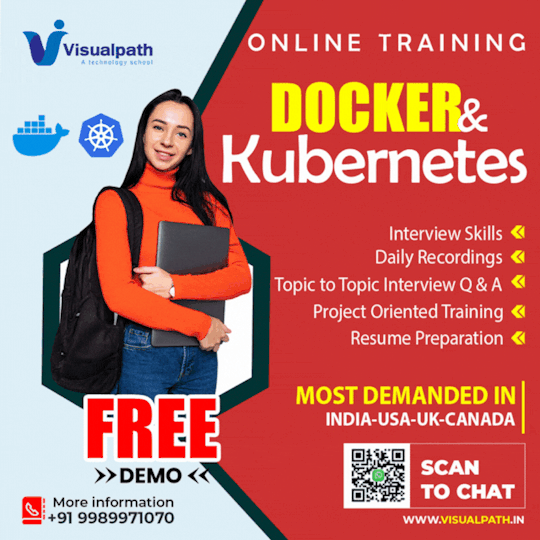
Kubernetes Online Training
Visualpath provides top-quality Docker and Kubernetes Online Training Worldwide led by real-time instructors. We offer daily recordings and presentations for reference. Enroll for a Free Demo. Call +91-9989971070.
WhatsApp: https://bit.ly/47eayBz
Visit: https://www.visualpath.in/DevOps-docker-kubernetes-training.html
Blog: https://dockerandkubernetesonlinetraining.blogspot.com/
#docker and kubernetes training#docker online training#docker training in hyderabad#kubernetes training hyderabad#docker and kubernetes online training#docker online training hyderabad#kubernetes online training#kubernetes online training hyderabad
0 notes
Text
Docker Training in Hyderabad | Visualpath
Guide to Setting Up a CI/CD Pipeline Process with Jenkins and Docker
Introduction:
Continuous Integration (CI) and Continuous Deployment (CD) pipelines are essential tools that enable teams to automate the building, testing, and deployment of their applications. Jenkins, a widely used automation server, combined with Docker, a popular containerization platform, provides a robust foundation for setting up such pipelines. - Docker and Kubernetes Training
Understanding CI/CD Pipelines:
CI involves automatically building and testing code changes as they are committed to the version control repository, ensuring that new changes do not introduce errors into the codebase. On the other hand, CD extends CI by automating the deployment of successful builds to production or staging environments, thereby enabling rapid and consistent delivery of applications. - Kubernetes Online Training
Introduction to Jenkins and Docker:
Jenkins is an open-source automation server that facilitates building, testing, and deploying software. It provides a user-friendly interface for defining pipelines and integrating with various tools and plugins. Docker, on the other hand, is a platform that enables developers to package applications and their dependencies into lightweight containers, ensuring consistency across different environments.
Setting Up the CI/CD Pipeline with Jenkins and Docker:
Install Jenkins: Begin by installing Jenkins on your server or local machine. You can follow the official Jenkins installation guide for your operating system.
Install Docker: Install Docker on the same machine where Jenkins is installed. Docker provides installation guides for various operating systems on its official website. - Docker Training in Hyderabad
Configure Jenkins Plugins: Install the necessary plugins in Jenkins to enable Docker integration and pipeline creation. Some essential plugins include Docker Pipeline, Pipeline, and Git.
Create a Jenkins Pipeline: Navigate to Jenkins and create a new pipeline project. Define the pipeline script using the Jenkinsfile syntax, specifying the stages for building, testing, and deploying the application.
Integrate Docker: Within the pipeline script, use Docker commands to build and package the application into a Docker image. You can also push the image to a Docker registry for distribution. - Docker Online Training
Automate Deployment: Incorporate stages in the pipeline script to deploy the Docker image to the desired environment, such as staging or production. Use Docker commands to run containers based on the deployed image.
Monitoring and Notifications: Configure Jenkins to send notifications upon pipeline completion or failure. You can integrate with email services or messaging platforms like Slack for real-time alerts.
Conclusion:
Implementing a CI/CD pipeline using Jenkins with Docker offers numerous benefits, including improved efficiency, reliability, and scalability in software development and deployment. By automating repetitive tasks and leveraging containerization technology, teams can streamline their workflows and deliver high-quality applications with greater speed and consistency.
Visualpath is the Leading and Best Institute for learning Docker And Kubernetes Online in Ameerpet, Hyderabad. We provide Docker Online Training Course, you will get the best course at an affordable cost.
Attend Free Demo
Call on - +91-9989971070.
Visit : https://www.visualpath.in/DevOps-docker-kubernetes-training.html
Blog : https://dockerandkubernetesonlinetraining.blogspot.com/
#docker and kubernetes training#docker online training#docker training in hyderabad#kubernetes training hyderabad#docker and kubernetes online training#docker online training hyderabad#kubernetes online training#kubernetes online training hyderabad
0 notes
Text
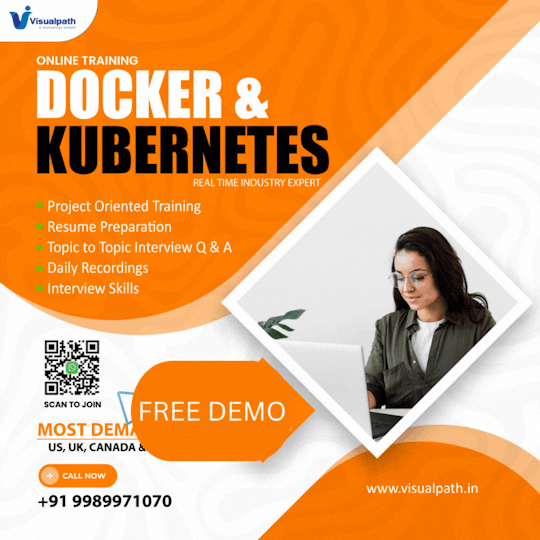
Docker and Kubernetes Training
Visualpath provides top-quality Docker and Kubernetes Online Training Worldwide led by real-time instructors. We offer daily recordings and presentations for reference. Enroll for a Free Demo. Call +91-9989971070.
WhatsApp: https://bit.ly/47eayBz
Visit: https://www.visualpath.in/DevOps-docker-kubernetes-training.html
Blog: https://dockerandkubernetesonlinetraining.blogspot.com/
#docker and kubernetes training#docker online training#docker training in hyderabad#kubernetes training hyderabad#docker and kubernetes online training#docker online training hyderabad#kubernetes online training#kubernetes online training hyderabad
0 notes
Text
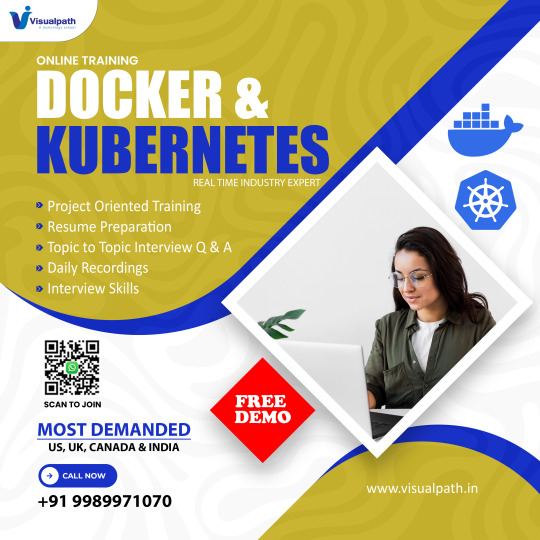
Docker and Kubernetes Training
Visualpath provides top-quality Docker and Kubernetes Online Training Worldwide led by real-time instructors. We offer daily recordings and presentations for reference. Enroll for a Free Demo. Call +91-9989971070.
WhatsApp: https://bit.ly/47eayBz
Visit: https://www.visualpath.in/DevOps-docker-kubernetes-training.html
Blog: https://dockerandkubernetesonlinetraining.blogspot.com/
#docker and kubernetes training#docker online training#docker training in hyderabad#kubernetes training hyderabad#docker and kubernetes online training#docker online training hyderabad#kubernetes online training#kubernetes online training hyderabad
0 notes
Text
Docker Online Training | Visualpath
Docker Machine and Docker Swarm: How They Work?
Introduction:
Docker, with its containerization technology, has revolutionized how applications are built, shipped, and deployed. However, managing Docker containers across various environments can still be a daunting task, especially when dealing with multiple hosts or cloud providers. This is where Docker Machine comes into play, offering a streamlined approach to managing Docker hosts regardless of the underlying infrastructure. - Docker and Kubernetes Training
Docker Machine:
Docker Machine is a tool that enables developers to create and manage Docker hosts on local machines, remote servers, or cloud providers effortlessly. It abstracts away the complexity of setting up Docker environments by automating the provisioning process. With Docker Machine, developers can easily spin up multiple Docker hosts, each with its own configuration, to run containerized applications. - Kubernetes Online Training
Simplified Deployment Workflow:
One of the key benefits of Docker Machine is its simplified deployment workflow. Instead of manually configuring Docker hosts on different platforms, developers can use Docker Machine to automate the process. By simply running a few commands, they can create Docker hosts on local machines for development or on remote servers for production deployment.
Multi-Cloud Support:
Docker Machine offers support for multiple cloud providers, including Amazon Web Services (AWS), Microsoft Azure, Google Cloud Platform (GCP), and more. This allows developers to deploy Docker hosts on their preferred cloud infrastructure without having to deal with the intricacies of each provider's setup process. - Docker Online Training
Scaling with Ease:
Scaling containerized applications can be challenging, especially when dealing with a large number of Docker hosts. Docker Machine simplifies the scaling process by allowing developers to quickly add or remove hosts as needed. Whether it's scaling horizontally to handle increased traffic or vertically to accommodate resource-intensive workloads, Docker Machine provides the tools to effortlessly manage the underlying infrastructure.
Integration with Docker Swarm:
For orchestrating and managing clusters of Docker hosts, Docker Machine seamlessly integrates with Docker Swarm. Developers can use Docker Machine to create Swarm nodes across multiple hosts, enabling high availability and fault tolerance for their applications.
Conclusion:
In conclusion, Docker Machine is a powerful tool for simplifying the management of Docker hosts across various environments. By automating the provisioning process and providing support for multi-cloud deployment, Docker Machine enables developers to focus on building and deploying applications rather than worrying about infrastructure setup.
Visualpath is the Leading and Best Institute for learning Docker And Kubernetes Online in Ameerpet, Hyderabad. We provide Docker Online Training Course, you will get the best course at an affordable cost.
Attend Free Demo
Call on - +91-9989971070.
Visit : https://www.visualpath.in/DevOps-docker-kubernetes-training.html
Blog : https://dockerandkubernetesonlinetraining.blogspot.com/
#docker and kubernetes training#docker online training#docker training in hyderabad#kubernetes training hyderabad#docker and kubernetes online training#docker online training hyderabad#kubernetes online training#kubernetes online training hyderabad
0 notes
Text
Docker and Kubernetes Training | Hyderabad
How to Store Images in Container Registries?
Introduction:
Container registries serve as central repositories for storing and managing container images, facilitating seamless deployment across various environments. However, optimizing image storage within these registries requires careful consideration of factors such as scalability, security, and performance. - Docker and Kubernetes Training
Choose the Right Registry:
Selecting the appropriate container registry is the first step towards efficient image storage. Popular options include Docker Hub, Google Container Registry (GCR), Amazon Elastic Container Registry (ECR), and Azure Container Registry (ACR). Evaluate factors such as integration with existing infrastructure, pricing, security features, and geographical distribution to make an informed decision.
Image Tagging Strategy:
Implement a robust tagging strategy to organize and manage container images effectively. Use semantic versioning or timestamp-based tagging to denote image versions and updates clearly. Avoid using generic tags like "latest," as they can lead to ambiguity and inconsistent deployments. - Kubernetes Online Training
Optimize Image Size:
Minimize image size by adhering to best practices such as using lightweight base images, leveraging multi-stage builds, and optimizing Dockerfiles. Removing unnecessary dependencies and layers helps reduce storage requirements and accelerates image pull times during deployment.
Security Considerations:
Prioritize security by implementing access controls, image signing, and vulnerability scanning within the container registry. Restrict image access based on user roles and permissions to prevent unauthorized usage. Regularly scan images for vulnerabilities and apply patches promptly to mitigate potential risks. - Docker Online Training
Automated Builds and CI/CD Integration:
Integrate container registries with continuous integration/continuous deployment (CI/CD) pipelines to automate image builds, testing, and deployment processes. Leverage tools like Jenkins, GitLab CI/CD, or GitHub Actions to streamline workflows and ensure consistent image updates across environments.
Content Trust and Image Signing:
Enable content trust mechanisms such as Docker Content Trust or Notary to ensure image authenticity and integrity. By digitally signing images and verifying signatures during pull operations, organizations can mitigate the risk of tampering and unauthorized modifications.
Data Backup and Disaster Recovery:
Implement robust backup and disaster recovery strategies to safeguard critical container images against data loss or corruption. Regularly backup registry data to redundant storage locations and establish procedures for swift restoration in the event of failures or disasters. - Docker and Kubernetes Online Training
Performance Optimization:
Optimize registry performance by leveraging caching mechanisms, content delivery networks (CDNs), and geo-replication to reduce latency and improve image retrieval speeds. Distribute registry instances across multiple geographical regions to enhance availability and resilience.
Conclusion:
By following best practices such as selecting the right registry, optimizing image size, enforcing security measures, and integrating with CI/CD pipelines, organizations can streamline image management and enhance their containerized deployments without diving into complex coding intricacies.
Visualpath is the Leading and Best Institute for learning Docker And Kubernetes Online in Ameerpet, Hyderabad. We provide Docker Online Training Course, you will get the best course at an affordable cost.
Attend Free Demo
Call on - +91-9989971070.
Visit : https://www.visualpath.in/DevOps-docker-kubernetes-training.html
Blog : https://dockerandkubernetesonlinetraining.blogspot.com/
#docker and kubernetes training#docker online training#docker training in hyderabad#kubernetes training hyderabad#docker and kubernetes online training#docker online training hyderabad#kubernetes online training#kubernetes online training hyderabad
0 notes
Text
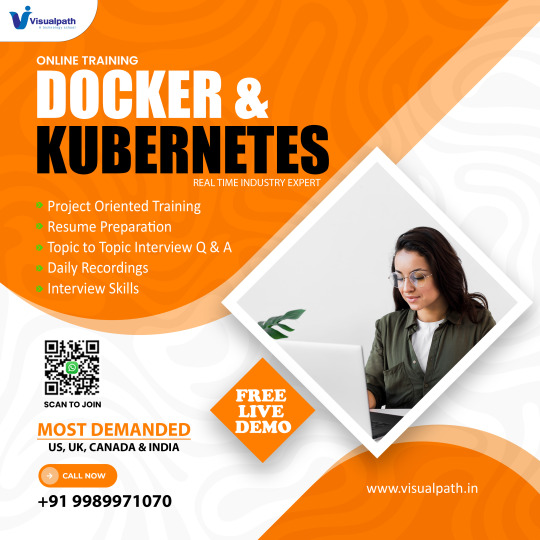
Docker and Kubernetes Training | Hyderabad
Visualpath provides top-quality Docker and Kubernetes Online Training Worldwide led by real-time instructors. We offer daily recordings and presentations for reference. Enroll for a Free Demo. Call +91-9989971070.
Visit Blog: https://dockerandkubernetesonlinetraining.blogspot.com/
WhatsApp: https://www.whatsapp.com/catalog/919989971070/
Visit: https://www.visualpath.in/DevOps-docker-kubernetes-training.html
#docker and kubernetes training#docker online training#docker training in hyderabad#kubernetes training hyderabad#docker and kubernetes online training#docker online training hyderabad#kubernetes online training#kubernetes online training hyderabad
0 notes